仁爱英语八年级unit1topic1学案教案
仁爱英语八年级上Unit 1 topic1 1 教案

Unit 1 Keeping Healthy !Topic 1 You should go to see a doctor !一、教学课题:You should go to see a doctor二、教学内容:1. Talking about illness2. To know how give advice to others三、教学目标:1. Understand the dialog about seeing a doctor.2. Learn how to express feelings and pains.3. Learn how to give advice to others.4. Learn to ask for and give advice四、教学重点:1. Understand the dialog about seeing a doctor.2. Learn how to express feelings and pains.五、教学难点:1. how to give advice to others2.how to express feelings and pains六、教学准备:叫学生准备好一些有关病痛的图片七、教具:图片, 录音机, 挂图, 小卡片八、课型:New lessonStep 1 Warming-up1. Ask the students some questions about the age, favourite things.2. Have a new dialogue.Step 2 PresentationGet five students out of the class, tell the other students that they are ill. Then, let the whole class to guess Wha t’s wrong with him/ her?Teach the new words and phrases:1.a cough2. sore eyes3. a backache.4. have a cold5. a fever6. a toothache7. flu8. a stomachacheStep 3. Look, listen and sayGet the students to look at the pictures, and then listen to the tape, then repeat .Step 4 PracticeGet the students to practice the dialogue in front of the classroom.Step 5 Pair workGet the students to follow the example to make a dialog.Section A (The second period)Step 1 Revision1. Get the students revise the new words and then have a dictation.2. Talk and write.Step 2 Look, ask and answerGet the students to act the patients, then have other students to guess: “ What’s wrong with him/ her?Help them to answer: He/ she has….Step 3 Team competitionsGet the students into 4 or 5 groups, and then have them to have a competition.Step 4 Look and matchGet the students to look at the statements, and then match the sentences.Step 5 HomeworkTranslate the following phrases or sentences into English or Chinese.1. have a toothache_____________2. see a doctor_____________3. have a stomachache _____________4. have a fever_____________5. have a cold_____________6. take a rest_____________7. 你最好多喝水_____________ 8. 你怎么啦? _____________9. 你应当早点上床睡觉_____________ 10. 她得了流行性感冒_____________Section BStep 1. Revision1. revise the illness.2. make a new conversation about talking the giving advices.Step 2. PresentationGet a student to act an patient, then the others help him“I’m sorry to hear thatmedicine( uncountable nouns)pill ( countable nouns)Step 3 Listen, read and actAsk the students to listen to the tape, then have them act the dialogue.Step 4 work aloneNumber the sentences to make a conversationThe keys are: 1-4-2-3-5-6Step 5 Pair workGet the students practice the conversation with their partnersStep 6 Work aloneCall the students match the advice with the problems.Section CStep 1 Revision1. get the students revise the new words and then have a dictation2. Pair work: get the students ask and answer in pairs about seeing a doctor.Step 2. Work aloneGet the students listen to the five conversations and check the correct pictures.Step 3. work aloneCall the students complete the sentences with the correct words in the box.Step 4 Listen, read and say.Get the students look at the pictures first, then listen it and answer the questions. Step 5. Do exerciseListen to the conversation and mark(T) for true and (F) for false.Section DStep 1. ReviewAsk some questions about what they learned in the last period.1. Who had an accident?2. What was wrong with him?Step 2. Presentation1. The teacher shows a letter and tell: This is a letter from Peter to Lily2. The teacher asks some questions about the passage.① Why can’t Peter read the books?② What was wrong with Peter?Step 3 ConsolidationDo 1b, first give Peter some advice orally, then let students write down their answers. Step 4. Practice1. Do 3, put the sentences into the right place2. Divide the class into two groups. Think of some problems about health.Step 5. HomeworkUsing “should” or “shouldn’t” to complete the statements.( ) 1. If you have a sore throat, you _________ have hot tea with honey.( ) 2. You_________ drink lots of boiled water when you have a fever.( ) 3. You_________ eat too many candies when you have a toothache.( ) 4. When you get a toothache, you _________ see a dentist.( ) 5. You _________drink cold water when you have a stomachache.( ) 6. You _________eat hot food when you have a sore throat.( ) 7. If you have a bad cold, you _________ work today.( ) 8. If you a stomachache, you _________ lie down and rest. You will feel better. ( ) 9. You _________ go to see the doctor when you have the flu.( )10. When you have a backache, you _________ stay in bed and have a good rest.十、课后小结本单元的第一个话题是以谈论身体各部位的不舒适等感觉而展开的, 让学生在学会交际用语的同时, 也能掌握有关提建议的主要句型You should……You shouldn’t……You’d better do somethingYou’d better not do something..。
Unit1 Topic 1 Section A 教案 仁爱版八年级英语上册
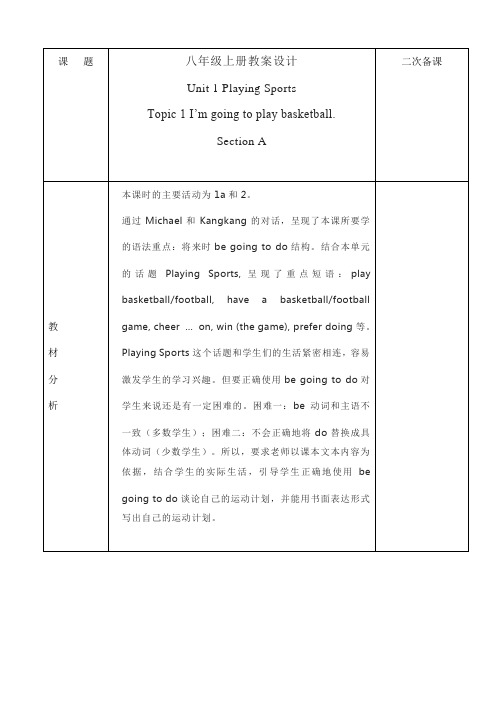
课题八年级上册教案设计Unit 1 Playing SportsTopic 1 I’m going to play basketball.Section A二次备课教材分析本课时的主要活动为1a和2。
通过Michael和Kangkang的对话,呈现了本课所要学的语法重点:将来时be going to do结构。
结合本单元的话题Playing Sports, 呈现了重点短语:play basketball/football, have a basketball/football game, cheer …on, win (the game), prefer doing等。
Playing Sports这个话题和学生们的生活紧密相连,容易激发学生的学习兴趣。
但要正确使用be going to do对学生来说还是有一定困难的。
困难一:be动词和主语不一致(多数学生);困难二:不会正确地将do替换成具体动词(少数学生)。
所以,要求老师以课本文本内容为依据,结合学生的实际生活,引导学生正确地使用be going to do谈论自己的运动计划,并能用书面表达形式写出自己的运动计划。
教学目标Knowledge aims:1. 能根据音标正确朗读出下列单词表中的单词:team, win, cheer, row, quite, during, against,practice…2. 能正确拼读并运用单词表中的黑体单词。
3. 能正确运用be going to do 表达运动计划。
4. 能正确地运用prefer doing结构表达喜好,如:prefer swimming, prefer rowing等。
5. 能运用本课所学语言,就自己的运动计划与他人交流。
Skill aims:1. 能听懂有关运动计划和运动爱好的简单对话和陈述。
2. 能正确地口头表达有关运动计划和运动爱好的话题。
3. 能正确朗读课本的文本材料,准确把握语音、语调及连读。
仁爱版八年级上Unit1Topic1(ABCD)学案

Unit 1 Topic 1 名词学期队伍 排,行 一点俱乐部 滑雪板 排球网球 运动员 梦想舞蹈演员 未来 (一份)工作赛跑者 课间休息 唱片黄金 奖牌 遗憾运动员 山脉 小时锻炼 棒球 周末跳跃 心,心脏 队友假期 肺 动词更喜欢加油,喝彩 获胜 划船骑自行车 加入 滑冰滑雪 成长,种植 打破,损坏度过,花费 锻炼 跳跃(使)适合,安装 (使)放松 到达离开,使…留下 形容词精力旺盛的金黄色的 单一的 漂亮的流行的 著名的 健康的激动的 奥运会的 副词几乎相当 十分 介词对着,反对短语为…加油许多,大量 长大成人 今后放弃 参加 既…又…花费(时间)做… 跳高 做运动相当好 跳远 到处对…有益 保持健康 后天到达某地 同…比赛 动身去某地Section A写出下面动词的过去式see--- play--- know--- have--- come--- win---cheer--- prefer--- row--- join--- skate---在文中找到并划出下列短语并翻译almost every day______________ during the summer holiday________________ this term____________have a basketball game against Class Three_______________________ cheer us on____________prefer rowing______________ row much______________ quite a bit / a lot_______________join the school rowing club______________________ table tennis___________________语法重点:be going to结构be going to + 动词原形---表示将要发生的事或打算,计划,决定要做的事,常与表示将来时间的状语连用。
八年级上册仁爱英语教案(最新7篇)
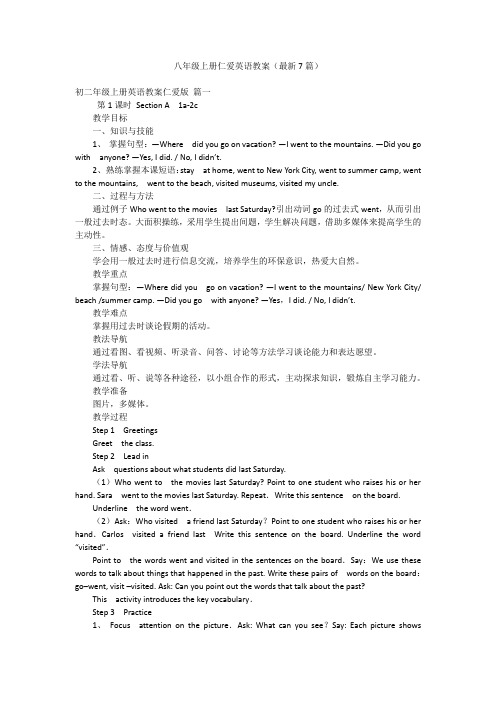
八年级上册仁爱英语教案(最新7篇)初二年级上册英语教案仁爱版篇一第1课时Section A 1a-2c教学目标一、知识与技能1、掌握句型:—Where did you go on vacation? —I went to the mountains. —Did you go with anyone? —Yes, I did. / No, I didn’t.2、熟练掌握本课短语:stay at home, went to New York City, went to summer camp, went to the mountains, went to the beach, visited museums, visited my uncle.二、过程与方法通过例子Who went to the movies last Saturday?引出动词go的过去式went,从而引出一般过去时态。
大面积操练,采用学生提出间题,学生解决问题,借助多媒体来提高学生的主动性。
三、情感、态度与价值观学会用一般过去时进行信息交流,培养学生的环保意识,热爱大自然。
教学重点掌握句型:—Where did you go on vacation? —I went to the mountains/ New York City/ beach /summer camp. —Did you go with anyone? —Yes,I did. / No, I didn’t.教学难点掌握用过去时谈论假期的活动。
教法导航通过看图、看视频、听录音、问答、讨论等方法学习谈论能力和表达愿望。
学法导航通过看、听、说等各种途径,以小组合作的形式,主动探求知识,锻炼自主学习能力。
教学准备图片,多媒体。
教学过程Step 1 GreetingsGreet the class.Step 2 Lead inAsk questions about what students did last Saturday.(1)Who went to the movies last Saturday? Point to one student who raises his or her hand. Sara went to the movies last Saturday. Repeat.Write this sentence on the board.Underline the word went.(2)Ask:Who visited a friend last Saturday?Point to one student who raises his or her hand.Carlos visited a friend last Write this sentence on the board. Underline the word “visited”.Point to the words went and visited in the sentences on the board.Say:We use these words to talk about things that happened in the past. Write these pairs of words on the board:go–went, visit –visited. Ask: Can you point out the words that talk about the past?This activity introduces the key vocabulary.Step 3 Practice1、Focus attention on the picture.Ask: What can you see?Say: Each picture showssomething a person did in the past.Name each activity and ask students to repeat: went to the mountains, went to New York City, went to summer camp, visited my uncle,stayed at home, went to the beach, visited museums.2.Point to the numbered list of activities.Say each one again and ask the students to repeat.3.Now, please match each phrase with one of the pictures.Say:Write the letter of each picture next to the name of the activity.Point to the sample answer.4.Check the answers.Step 4 Listening1.Point to the picture on the screen. Say: look at Picture A,Where did Tina go on vacation? Yes,she went to the mountains.Ask:What did the person do in each scene? Say: There are three conversations. Play the recording the first time.2、The people talk about what they did on vacation.Listen to the recording and write numbers of the names in the right boxes in the picture. Please write only 5 numbers. Point out the sample answer next to the picture showing went to the mountain. Play the recording a second time.3.Correct the answers.Step 5 Pair workPoint out the example conversation. Ask two students to read the dialogue to the class. Say the dialogue in the picture with a student,Do a second example to the class. Then say:Now work with a partner, make conversations about the people in the pictures.As they talk,move around the classroom monitoring their work. Offer language or pronunciation support as needed.Step 6 Listening1.2a. Ask: Where did the people go on vacation? And then ask the students to listen carefully and fill in the chart. Play the recording twice and then check the answers.2、Look at the form carefully, ask: Did the people do the following things? Then ask thestudents to listen carefully and check the anwers. Play twice and ask the students to check the answers in pairs and then check the answers together.Step 7 Role playLook at the form again carefully and make role-play conversations among Grace, Kevin and Julie. Ask one or two groups to show the conversation first and then get the students to practice in groups.仁爱版英语八年级上册教案篇二一、知识与技能1、掌握重点句型:How was your vacation?Where did you go? Did you go out with anyone?2、理解并掌握几个不定代词:anyone, everyone, something, anything, everything, nothing 的用法。
仁爱英语八年级上册 Unit 1 Topic 1 导学案
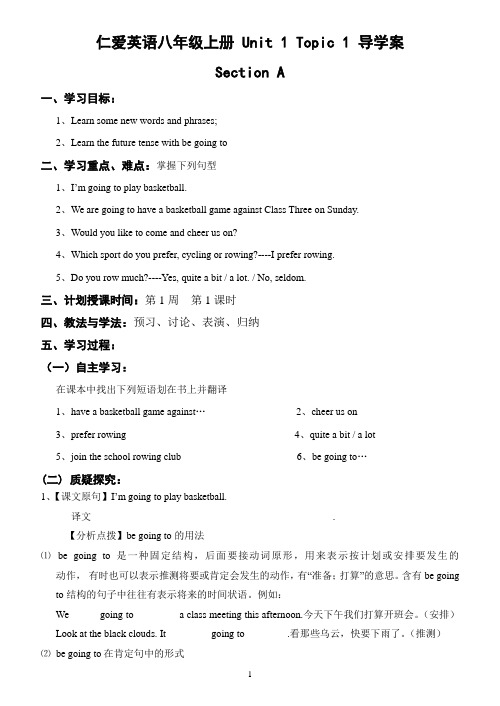
仁爱英语八年级上册 Unit 1 Topic 1 导学案Section A一、学习目标:1、Learn some new words and phrases;2、Learn the future tense with be going to二、学习重点、难点:掌握下列句型1、I’m going to play basketball.2、We are going to have a basketball game against Class Three on Sunday.3、Would you like to come and cheer us on?4、Which sport do you prefer, cycling or rowing?----I prefer rowing.5、Do you row much?----Yes, quite a bit / a lot. / No, seldom.三、计划授课时间:第1周第1课时四、教法与学法:预习、讨论、表演、归纳五、学习过程:(一)自主学习:在课本中找出下列短语划在书上并翻译1、have a basketball game against…____________2、cheer us on ______________3、prefer rowing ________________4、quite a bit / a lot____________5、join the school rowing club______________6、be going to…______________(二) 质疑探究:1、【课文原句】I’m going to play basketball.译文________________________________________________.【分析点拨】be going to的用法⑴be going to是一种固定结构,后面要接动词原形,用来表示按计划或安排要发生的动作,有时也可以表示推测将要或肯定会发生的动作,有“准备;打算”的意思。
Unit1 Topic1 仁爱版英语八年级上册同步教案

八上Unit1 Topic1 I’m going to play basketball. 教案一、重点短语&句型play against对抗,比赛cheer...on为...加油prectice doing sth练习做某事prefer doing/to do更喜欢做某事go skating去溜冰go cycling去骑车grow up长大in the future在将来,今后be good at擅长...join in = take part in参加be good for对...有益all over遍及the day after tomorrow后天keep healthy/fit保持健康leave for动身去二、语法1.一般将来时(1)定义:表示将来某个时间要发生的动作或存在的状态。
常连用的时间状语有:tomorrow、soon、later、next、in a few days、some day、in the future等。
(2)结构:主语+ be going to + do主语+ will/shall + doe.g. Look at those cloud! It’s going to rain.看那些云!天要下雨了。
e.g. What are you going to do tomorrow? 你明天打算做什么?e.g. I won’t go to London next month. 我下个月不打算去伦敦。
(3)肯定句,否定句,疑问句转化① be going to结构肯定句:They are going to play football. 他们打算去踢足球。
否定句:They aren’t going to play football. 他们不打算去踢足球。
一般疑问句:Are they going to play football? 他们打算去踢足球吗?特殊疑问句:What are they going to do? 他们打算去干什么?②will结构肯定句:She will go to Shanghai. 她将要去上海。
仁爱版八年级英语上册UNIT 1 TOPIC 1 Section A教案
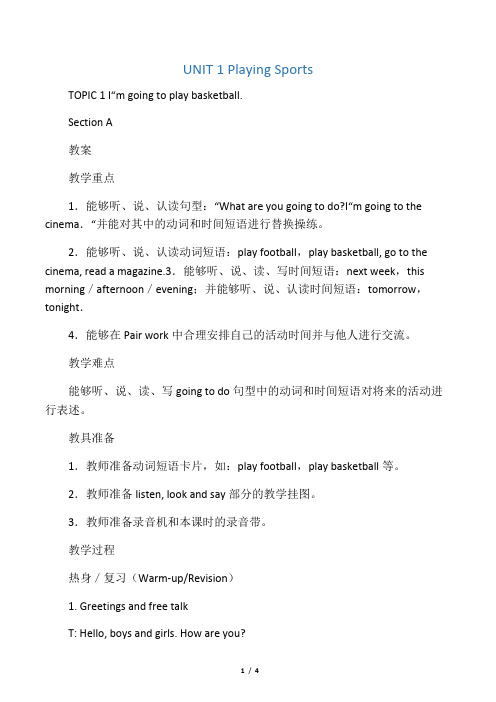
UNIT 1 Playing SportsTOPIC 1 I“m going to play basketball.Section A教案教学重点1.能够听、说、认读句型:“What are you going to do?I“m going to the cinema.“并能对其中的动词和时间短语进行替换操练。
2.能够听、说、认读动词短语:play football,play basketball, go to the cinema, read a magazine.3.能够听、说、读、写时间短语:next week,this morning/afternoon/evening;并能够听、说、认读时间短语:tomorrow,tonight.4.能够在Pair work中合理安排自己的活动时间并与他人进行交流。
教学难点能够听、说、读、写going to do句型中的动词和时间短语对将来的活动进行表述。
教具准备1.教师准备动词短语卡片,如:play football,play basketball等。
2.教师准备listen, look and say部分的教学挂图。
3.教师准备录音机和本课时的录音带。
教学过程热身/复习(Warm-up/Revision)1. Greetings and free talkT: Hello, boys and girls. How are you?S: Hello, Miss. I’m fine, thank you, and you?T: I’m fine, too. Thank you very much.(Say hello to the teachers together)教师课前放歌曲“What Are You Going to Do?“学生初步感知be going to do句型。
师生进行日常会话,可将重点放在动词短语的问答上,如:T:What day is it today ?S:It“s Tuesday.T:What day is it tomorrow ?S:It“s Wednesday.T:What do you usually do On Wednesdays/in the evening?S:I usually read books.呈现新课1. Lead in(1)学生朗读书本段落进行学习。
仁爱版英语八年级上册Unit1_Topic1_SectionA优质课教案
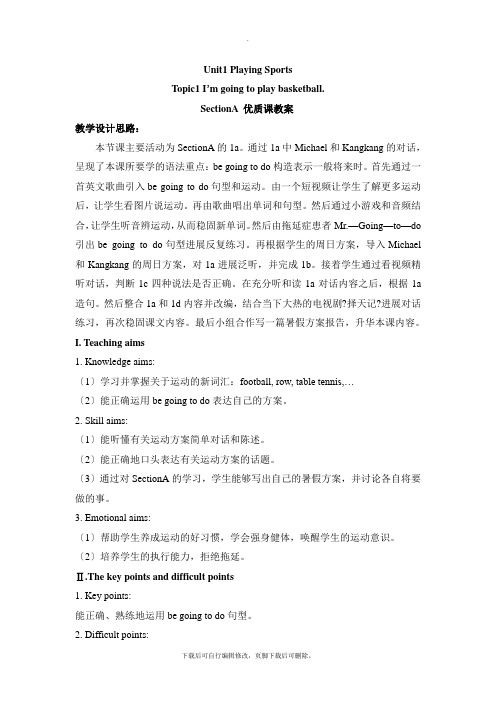
Unit1 Playing SportsTopic1 I’m going to play basketball.SectionA 优质课教案教学设计思路:本节课主要活动为SectionA的1a。
通过1a中Michael和Kangkang的对话,呈现了本课所要学的语法重点:be going to do构造表示一般将来时。
首先通过一首英文歌曲引入be going to do句型和运动。
由一个短视频让学生了解更多运动后,让学生看图片说运动。
再由歌曲唱出单词和句型。
然后通过小游戏和音频结合,让学生听音辨运动,从而稳固新单词。
然后由拖延症患者Mr.—Going—to—do 引出be going to do句型进展反复练习。
再根据学生的周日方案,导入Michael 和Kangkang的周日方案,对1a进展泛听,并完成1b。
接着学生通过看视频精听对话,判断1c四种说法是否正确。
在充分听和读1a对话内容之后,根据1a 造句。
然后整合1a和1d内容并改编,结合当下大热的电视剧?择天记?进展对话练习,再次稳固课文内容。
最后小组合作写一篇暑假方案报告,升华本课内容。
I. Teaching aims1. Knowledge aims:〔1〕学习并掌握关于运动的新词汇:football, row, table tennis,…〔2〕能正确运用be going to do表达自己的方案。
2. Skill aims:〔1〕能听懂有关运动方案简单对话和陈述。
〔2〕能正确地口头表达有关运动方案的话题。
〔3〕通过对SectionA的学习,学生能够写出自己的暑假方案,并讨论各自将要做的事。
3. Emotional aims:〔1〕帮助学生养成运动的好习惯,学会强身健体,唤醒学生的运动意识。
〔2〕培养学生的执行能力,拒绝拖延。
Ⅱ.The key points and difficult points1. Key points:能正确、熟练地运用be going to do句型。
- 1、下载文档前请自行甄别文档内容的完整性,平台不提供额外的编辑、内容补充、找答案等附加服务。
- 2、"仅部分预览"的文档,不可在线预览部分如存在完整性等问题,可反馈申请退款(可完整预览的文档不适用该条件!)。
- 3、如文档侵犯您的权益,请联系客服反馈,我们会尽快为您处理(人工客服工作时间:9:00-18:30)。
一、知目【重要】duringthesummerholidays 在暑期期between⋯and⋯在二者之3 .cheersb.on 某人加油4 .preferdoingsth.更喜做某事5 .quiteabit/alot 好多6 .plantodosth.划做某事7 .haveaskatingclub滑雪俱部goskating/skiing/bicycling/climbing/hiking去滑雪/溜冰//登山/足1 0.arrivein/at抵达1 1.playagainst⋯与⋯⋯抗/量1 2.forlong好久1 3.leavefor⋯身去⋯1 4.thedayaftertomorrow 后天1 5.China’snationalteam 中国国家1 6.playbaseball打棒球1 7.Whatashame!多惭愧!1 8.begoodat擅长做某事1 9.takepartin参加2 0.allovertheworld全球2 1.begoodfor⋯⋯有利2 2.agoodway一种好方法2 3.keepfit/healthy 保持健康2 4.relaxoneself 放松某人自己【重点句型】’syourfavoritesport?=Whatsportdoyoulikebest?2.你最喜的运是什么?sport doyouprefer? =Whichsport doyoulike better? 你更喜什么运?Ipreferskating.=Ilikeskatingbetter. 我更喜滑雪.youskatemuch?=Doyouoftenskate? 你常滑雪? spendsatleasthalfanhourinthegymeveryday. 每日她起码花半小在体育. playsbaseballprettywellandsheisalsogoodatjumping.她棒球打得相当好并且擅于跳.kindofsportsdoyoulike?=Whichsportdoyoulike? 你喜哪一种运 ? youliketocomeandcheeruson? 你愿意来我加油?areyougoingtobewhenyougrowup? 当你大后做什么?isgoingto beaschoolsportsmeetnextmonth. 下月有一运会。
【重点法】一般未来:(一)begoingto构:①表示主行某一未来行的打算、意。
种打算常先考并含有自己做好某些准的意思,所以往常用begoingto表达的行很可能会践。
如:I’mgoingtoplaybasketballwithmyclass我打算本周日和同学一同打球。
matesthisSunday.Sheisgoingtobuyasweaterforhermother.她打算她一件毛衣。
②表。
指依据迹象推,并且上或很快就要生。
如:Lookatthoseclouds.It ’sgoingtorain.瞧那些云!快要下雨了!(二)will +原形:表示的未来事,常与表未来的状如:tomorrow,soon, later,nexttime(week/month/year⋯)等用。
willnot=won’t;略形式’ll.①表示作出立刻的决定。
种意并未预先的考或划,是的一种决定。
如:a.----Pleaseputyourthingsaway,Tom. 姆,把你的西整理好。
---- I’msorry.I’lldoitrightaway.不起。
我上就去做。
b.----Wouldyoulikecoffeeortea? 您要咖啡是茶?----Iwillhaveacupoftea,please. 我要一杯茶。
c.Don’tworry.I’llhelpyou.担忧。
我会帮你的。
②表示。
指人于未来的见解、假和推。
如:I’msureourteamwillwinnexttime.我确信下次我会。
Maybeshewillgotothegym. 也她会去体育。
③表示。
如:I’lldobetternexttime.下次我会做得更好的。
I’llvis ityoutomorrow. 明日我会去看你的。
④句式一定句:I/She/He/Theywillgotoplaybaseballsoon.否认句:I/She/He/Theywon’tgotoplaybaseballsoon.一般疑句:Willyou/she/he/theygotoplaybaseballsoon?回答:Yes,I/she/he/theywill. No,I/she/he/theywon ’t.(三)plan,come,go,leave,fly 等用内行表示将要生的事.如:I’mcoming.我就来。
HeisleavingforShanghai. 他将到上海去。
WearegoingtoBeijing. 我将去北京。
二.重点点1. seesb.dosth “看某人做了某事”作的全程,常与everyday;often等用.seesb.doingsth. “看某人正在做某事”作正内行 .如:Isawyou play basketballalmost everydayduringthesummerholidays.I often seehim drawpicturesneartheriver. 我常看她在河画画.Isawher goacrossthestreet. 我看她了路Isawher goingacrossthestreet. 我看她正在路.似构:watch,hear,feel 等感.joinsb.表示“加入某人的队列”“和某人在一同”join+ 表示“加入某个”joinin/takepartin 表示“参加/列席某个活”:Willyoujoinus?Iwilljointheskiingclub.Sheisplanningtotakepartinthehighjump.in+大地址arriveat +小地址getto+ 地址=reach+ 地址:MyunclearrivedinBeijingyesterday.IarrivedattheGreatWall.=IgottotheGreatWall.=IreachedtheGreatWall.注意:reachhere/there/home=gethere/there/home=arrivehere/there/home⋯走开⋯⋯leavefor ⋯身去⋯/走开到⋯如:TheyareleavingBeijingtomorrow. 明日他要走开北京. TheyareleavingforJapanthedayaftertomorrow. 后天他要前去日本few “几个;一些”修可数名alittle “一点点”修不数名.:Thereareafeweggsinthebasket.Thereisalittlewaterinthebottle.long 表示“多久( )”;提段.howoften 表示“多常; 多久一次”;提的率.如:Theywill stay inBeijing for aweek.→Howlongwillthey stay in Beijing?Heplaysbasketballtwiceaweek .→Howoftendoesheplaybasketball?goodat(doing)sth.=dowellin(doing)sth. 擅于(做)某事:Sheisgoodat(playing)baseball.=Shedoeswellin(playing)baseball.sth/sb+adj.使某物(某人)在某种状keepsth/sb+adj. 保持某物(某人)在某种状:Playingsoccercanmakeyourbodystrong.Swimmingcanhelptokeepyourheartandlungshealthy.三、典型例解( )1. —_______doyouprefer,walkingorrunning?—Ilikerunningbetter.A.WhatB.HowC.WhenD.Which剖析:D——句中要求在二者之中挑,故用which。
( )2. —Areyougoingto_______ourEnglishclub?—Yes,Iam.A.takepartin Bjoin C.tookpartin D.joined剖析:B——begoingtodo表示只好原形。
同要求成club 成,而不是“参加”某活,故不可以A。
( )foreignersarrived_______Shanghai_______night.A.at;atB.in;atC.in;inD.at;in剖析:B——arrivein/at 抵达,in 后的大地址,at后的小地址。
在夜晚用atnight, 故B。
( )4.XuXiaandherteammatesare_______theU.S.A.nextweek.A.leavingforB.leaveforC.toD.left剖析:A——leavefor 表示“身去某地”,同要考关系。
非延性,如go,leave 用内行表示未来。
( ).Xiangisthebestteacherinourschool.Heisgood_______teaching.A.forB.toC.withD.at(剖析:D——begoodat 擅长⋯⋯)wanttobeadoctorwhenI_______.(A.growupB.talkaboutC.getup 剖析:A——growup 意为“长大,成人”。
)seeWeiHan_______Englishalmosteverymorning.A.readsB.readingC.read剖析:C——考察seesb.dosth. 注意句末的 everymorning,D.wasbornD.toread故不可以选B。
(seesb.doingsth.)( )8. —Whichteamareyougoingtoplay_______thedayaftertomorrow?—AteamfromMiddleSchool.Ihopewewillwin.A.aboutB.withC.forD.against剖析:D——playagainst 表示竞赛活动的抗衡性,而不是共同参加某项活动,故不可以选B。
()spendstwohours_______hishomeworkeveryday.A.todoB.doing剖析:B——spendsometimedoingsth./onsth.应选B。
